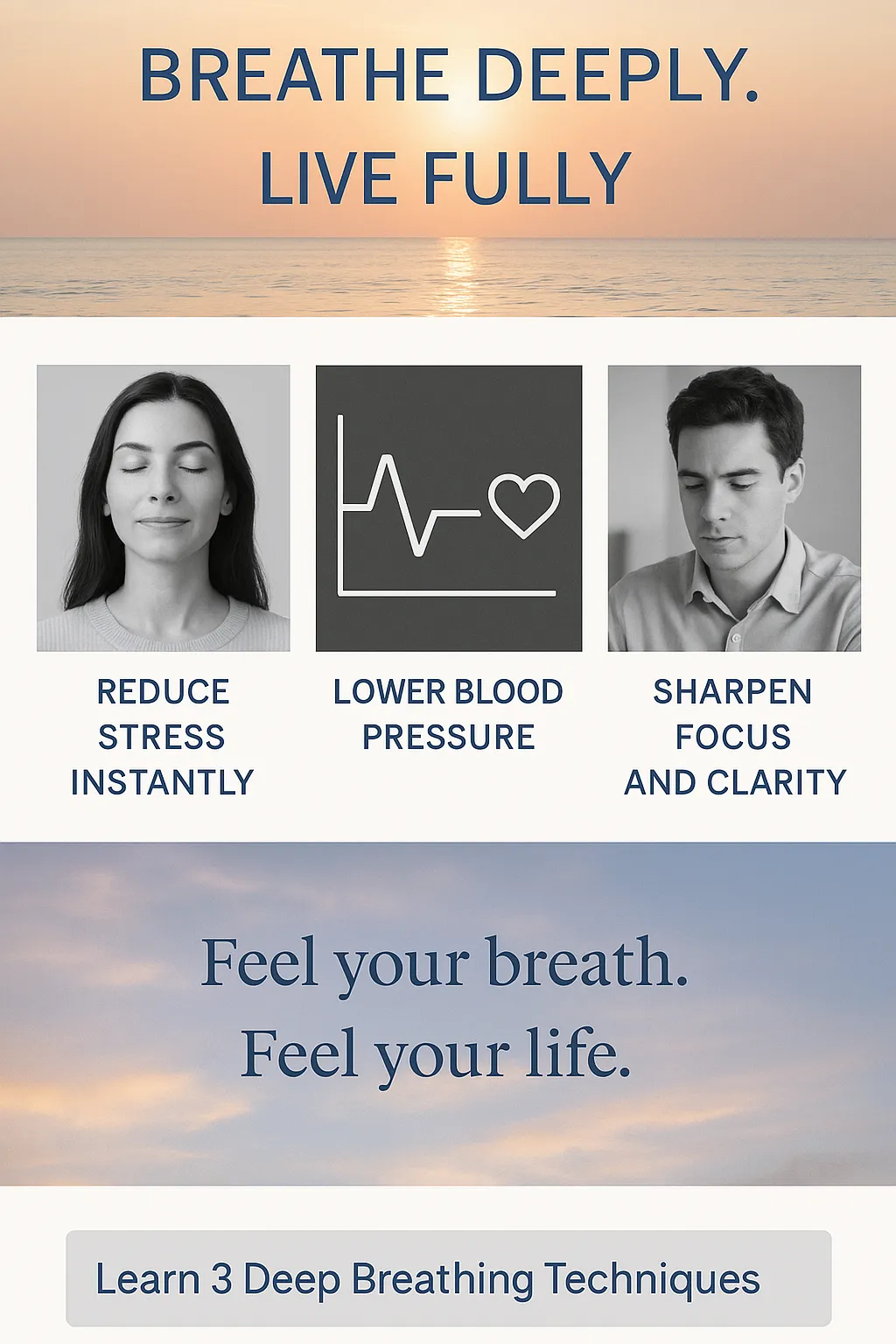
The Power of Deep Breathing: A Simple Tool for Profound Change
In a world that thrives on speed and constant stimulation, the idea that something as simple as breathing could hold the key to better health, sharper focus, and inner peace may seem almost too good to be true. Yet, across cultures and centuries, deep breathing has been recognized as a powerful tool for healing and growth. Today, modern science is catching up, revealing the incredible benefits of conscious, controlled breathing — and why it deserves a central place in our daily lives.
What Is Deep Breathing?
At its core, deep breathing — also called diaphragmatic breathing or belly breathing — involves inhaling slowly and deeply through the nose, filling the lungs fully, and allowing the diaphragm (the large muscle at the base of the lungs) to expand downward. This form of breathing is the opposite of shallow chest breathing, which many of us unconsciously do when stressed or anxious.
Deep breathing engages the parasympathetic nervous system, often called the “rest and digest” system, helping the body shift out of “fight or flight” mode and into a state of relaxation.
The Science Behind Deep Breathing
Research consistently shows that conscious breathing has a direct impact on the body’s physiology:
• Reduces Stress: Deep breathing lowers cortisol levels, the hormone associated with stress. When you take slow, deep breaths, you send a message to your brain that it’s safe to relax. In turn, the brain tells the body to calm down.
• Lowers Blood Pressure: Studies have found that slow, deep breathing helps to lower blood pressure by improving circulation and relaxing the blood vessels
• Enhances Focus and Cognitive Function: When your brain gets more oxygen through deep breathing, you experience clearer thinking, better concentration, and even improved memory.
• Balances Emotions: Conscious breathing helps regulate emotions by calming the amygdala — the part of the brain that processes fear and emotional responses.
• Strengthens the Immune System: A relaxed body can allocate more resources to defense and repair mechanisms, boosting immunity over time.
Ancient Wisdom Meets Modern Practice
Deep breathing is a cornerstone of ancient practices like yoga, tai chi, qigong, and various forms of meditation. These traditions intuitively understood what science now confirms: that our breath is a bridge between body and mind.
In yoga, for example, pranayama (the practice of breath control) is considered essential for controlling life force energy. Similarly, in Buddhist meditation, attention to breath is a primary way to develop mindfulness and compassion.
Today, therapists, coaches, and medical professionals integrate breathing exercises into treatments for anxiety, PTSD, chronic pain, and more.
Simple Deep Breathing Techniques You Can Try
1. Box Breathing:
• Inhale for 4 counts
• Hold the breath for 4 counts
• Exhale for 4 counts
• Hold the breath out for 4 counts
(Repeat several rounds.)
2. 4-7-8 Breathing:
• Inhale through the nose for 4 counts
• Hold the breath for 7 counts
• Exhale slowly through the mouth for 8 counts
(This technique is especially useful for sleep.)
3. Diaphragmatic Breathing:
• Place one hand on the chest and one on the belly.
• Breathe in deeply through the nose, ensuring the belly (not the chest) rises.
• Exhale slowly through pursed lips.
(Practice for 5–10 minutes daily.)
Why We Often Forget to Breathe Deeply
Despite its simplicity, many people rarely breathe deeply unless consciously prompted. Stress, poor posture, and our fast-paced lifestyles condition us to favor shallow breathing. Over time, this habit contributes to heightened anxiety, fatigue, and even illness.
The good news? Just a few minutes of deep breathing each day can begin to retrain your body and mind, unlocking greater resilience and calm.
How to Make Deep Breathing a Daily Habit
• Morning Ritual: Start your day with 5 minutes of deep breathing to center yourself.
• During Work Breaks: Use breathing exercises during short breaks to reset your energy and focus.
• Before Sleep: End your day with slow breathing to promote better rest.
• Anchor It to Activities: Pair breathing exercises with daily activities (like brushing your teeth or commuting) to help build the habit effortlessly.
Final Thoughts
In a society that often seeks solutions outside of ourselves — in technology, medications, or endless distractions — the breath reminds us that profound power lies within. Each inhale and exhale is a chance to return to yourself, to calm your body, clear your mind, and renew your spirit.
You don’t need expensive equipment, special training, or hours of free time. You just need to pause… and breathe.
Start today.
One deep breath at a time.
